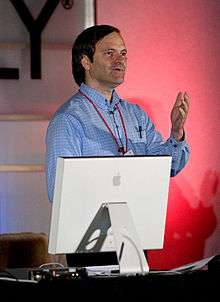Udi Manber
| Udi Manber | |
|---|---|
 Udi Manber at the 2005 Where 2.0 Conference | |
| Institutions |
National Institutes of Health Yahoo! University of Washington University of Arizona Amazon.com A9.com |
| Thesis | Concurrency Control for Dynamic Data Structures and Fault Tolerance (1982) |
| Notable awards | Presidential Young Investigator Award |
Udi Manber (Hebrew: אודי מנבר) is an Israeli computer scientist. He is one of the authors of agrep and GLIMPSE. He is currently with the National Institutes of Health.
Education
He earned both his bachelor's degree in 1975 in mathematics and his master's degree in 1978 from the Technion in Israel. At the University of Washington, he earned another master's degree in 1981 and his Ph.D. in computer science in 1982.
Career
He has won a Presidential Young Investigator Award in 1985, 3 best-paper awards, and the Usenix annual Software Tools User Group Award software award in 1999. Together with Gene Myers he developed the suffix array, a data structure for string matching.[1]
He was a professor at the University of Arizona and authored several articles while there. He wrote Introduction to Algorithms — A Creative Approach.[2]
He became the chief scientist at Yahoo! in 1998.
In 2002, he joined Amazon.com, where he became "chief algorithms officer" and a vice president. He later was appointed CEO of the Amazon subsidiary company A9.com. He filed a patent on behalf of Amazon.[3] In 2004, Google even promoted sponsored listings for its own recruiting whenever someone searched for his name on Google's search engine.
In 2006, he was hired by Google as one of their vice presidents of engineering.[4] In December 2007, he announced Knol, Google's new project to create a knowledge repository.[5]
In October 2010, he was also responsible for all the search products at Google.[6]
In October 2014, Manber was named the vice president of engineering at YouTube.[7]
In February 2015, Manber announced that he was leaving YouTube for the National Institutes of Health.[8]
References
- ↑ Manber, U.; Myers, G. (1993). "Suffix Arrays: A New Method for On-Line String Searches". SIAM J. Comput. 22 (5): 935–948. doi:10.1137/0222058.
- ↑ Manber, Udi (1989). Introduction to algorithms: a creative approach. Addison-Wesley. ISBN 0-201-12037-2.
- ↑ US 7287042 "Search engine system supporting inclusion of unformatted search string after domain name portion of URL" oldest priority March 3, 2004
- ↑ http://articles.businessinsider.com/2010-10-22/tech/30064259_1_udi-manber-google-search-microsoft-s-bing
- ↑ Manber, Udi (2007-12-13). "Encouraging people to contribute knowledge". Official Google Blog. Google. Retrieved 2008-04-23.
- ↑ Claburn, Thomas (2010-10-14). "Google's Marissa Mayer Gets New Job Description". Information Week. Retrieved 2010-10-14.
- ↑ D'Onfro, Julian (October 3, 2014). "Meet The Superstar Team Of Google Veterans Who Are Changing YouTube". Retrieved October 4, 2014.
- ↑ Winkler, Rolfe. "Search Whiz Udi Manber Leaves Google". Retrieved 4 April 2015.
External links
- IT Conversations podcast about Google search
|